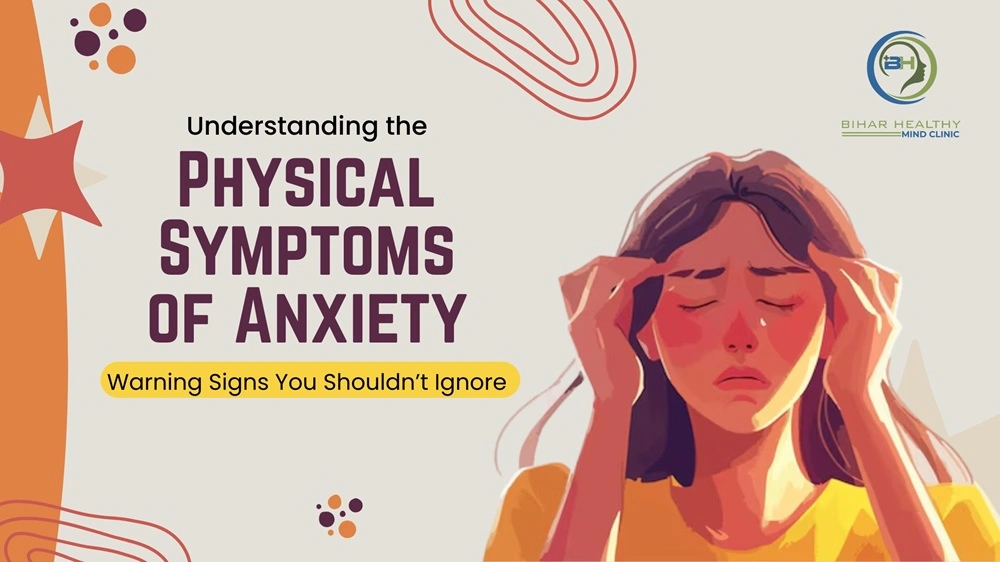
Anxiety isn’t just a mental struggle, it’s a physical one too. While most people associate anxiety with excessive worrying or restlessness, the physical symptoms of anxiety often go unnoticed or misunderstood. From rapid heartbeat to unexplained fatigue, these symptoms can mimic serious medical issues, leaving patients confused and distressed.
At Patna Psychiatry, under the guidance of Dr. Saurabh Kumar, MD (Psychiatry), recognized as the best psychiatrist in Patna, patients receive comprehensive diagnosis and evidence-based treatment to manage both the mental and physical aspects of anxiety. Let’s explore how anxiety manifests physically and why early recognition is crucial.
Understanding the Physical Symptoms of Anxiety
1. The Body’s Connection to the Mind
Anxiety triggers the body’s natural “fight-or-flight” response, a built-in survival mechanism. When faced with stress or fear, the brain signals the release of hormones like adrenaline and cortisol. These chemicals increase heart rate, tighten muscles, and heighten alertness.
However, when anxiety becomes chronic, this response stays activated even when there’s no real danger. Over time, it leads to persistent physical symptoms such as muscle tension, fatigue, or digestive distress.
This physiological connection between the brain and the body explains why emotional turmoil can translate into actual physical discomfort.
2. Common Physical Symptoms of Anxiety
Recognizing physical symptoms of anxiety can help differentiate between stress-related issues and other medical conditions.
-
Here are some commonly observed signs:
- Increased Heart Rate or Palpitations: A racing heart is one of the most frequent physical signs. Patients often mistake it for a cardiac issue.
- Muscle Tension and Pain: Constant tightening of muscles leads to stiffness, headaches, or neck and shoulder pain.
- Shortness of Breath: Anxiety can make you feel like you’re suffocating or can’t take a deep breath.
- Sweating and Trembling: The body releases excessive perspiration, and hands may tremble during anxious episodes.
- Gastrointestinal Problems: Nausea, diarrhea, or stomach cramps are common physical symptoms of anxiety and depression due to the gut-brain connection.
- Chronic Fatigue: Even after resting, anxiety sufferers often feel drained, both mentally and physically.
- Sleep Disturbances: Anxiety can prevent restful sleep, leading to insomnia or vivid, distressing dreams.
These symptoms can appear gradually or suddenly, depending on the severity and duration of anxiety.
3. Physical Symptoms of Anxiety and Depression: A Combined Challenge
Anxiety and depression frequently occur together, amplifying physical suffering. When both conditions overlap, the body endures an even greater strain.
-
Individuals may experience:
- Persistent physical symptoms like headaches, body aches, or dizziness.
- Low energy levels and difficulty concentrating.
- Unexplained pain that doesn’t respond to medical treatment.
At Patna Psychiatry, patients struggling with physical symptoms of anxiety and depression are offered holistic care that addresses emotional and physiological factors simultaneously. This integrated approach ensures long-term recovery rather than temporary relief.
4. When Should You Seek Professional Help?
It’s normal to feel anxious occasionally - before a presentation, exam, or important life event. But if the physical symptoms of anxiety persist, interfere with daily functioning, or occur without clear triggers, it’s time to consult a specialist.
-
Warning signs include:
- Constant fatigue or body pain without a medical cause
- Irregular heartbeat despite a normal cardiac evaluation
- Severe headaches or gastrointestinal issues that worsen under stress
- Sudden dizziness or trembling
Ignoring these indicators can worsen mental health over time and may lead to panic attacks or depressive episodes.
5. Treatment and Recovery at Patna Psychiatry
At Patna Psychiatry, treatment begins with a detailed assessment to rule out underlying medical issues. Dr. Saurabh Kumar, one of the best psychiatrists in Patna, uses a personalized approach that combines:
- Cognitive Behavioral Therapy (CBT): Helps identify and modify anxious thought patterns.
- Relaxation and Mindfulness Techniques: Teach patients how to regulate breathing and muscle tension.
- Medication (if required): Antidepressants or anti-anxiety medications are prescribed judiciously.
- Lifestyle Modifications: Balanced diet, sleep hygiene, and regular physical activity are emphasized.
This multi-dimensional strategy not only alleviates symptoms but also empowers patients to regain control over their lives.
6. Self-Care Strategies to Manage Physical Symptoms
While professional help is vital, incorporating simple coping techniques can complement therapy:
- Practice deep breathing or meditation daily.
- Limit caffeine and alcohol intake.
- Engage in regular exercise to release endorphins.
- Maintain a consistent sleep routine.
- Share your feelings with trusted friends or family.
These small yet consistent efforts can significantly reduce physical symptoms of anxiety and promote overall well-being.
7. The Road to Healing
Recovery from anxiety is a journey that requires patience, guidance, and the right support. Remember, physical symptoms are not “all in your head”, they are real and deserve attention. With the right psychiatric care, these distressing signs can be effectively managed.
If you or a loved one experiences persistent physical symptoms of anxiety and depression, don’t wait until they disrupt daily life. Seek expert help at Patna Psychiatry, where compassionate and evidence-based treatment paves the way for lasting recovery.
Conclusion
Anxiety doesn’t only affect the mind; it takes a toll on the body too. Recognizing and addressing these physical symptoms of anxiety early can prevent long-term complications. With the right diagnosis and professional support from Dr. Saurabh Kumar, the best psychiatrist in Patna, individuals can reclaim peace, stability, and confidence.
Visitors: 67





No comments yet.